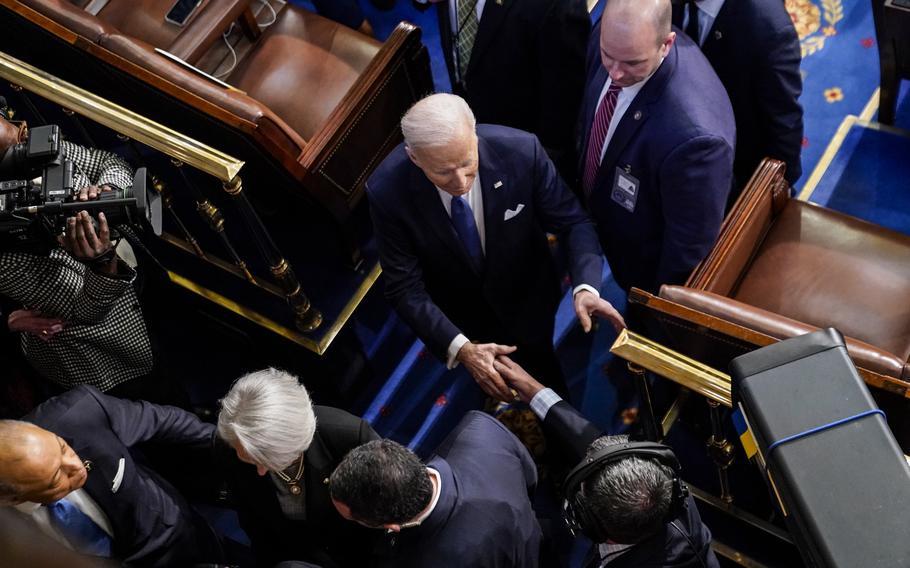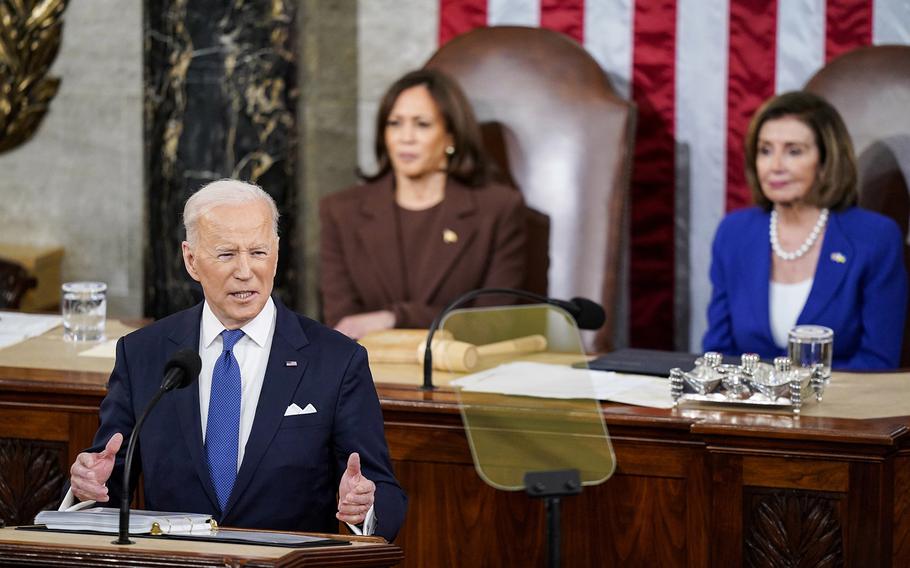
President Joe Biden after delivering his State of the Union address to a joint session of Congress on March 1, 2022. (Jabin Botsford/Washington Post)
WASHINGTON - One prominent liberal felt the speech "left a little to be desired" in its ambition. A veteran Republican strategist called it a "missed opportunity to lead." And the conservative leaning New York Post mocked President Joe Biden for drawing fewer viewers than his predecessors did in similar speeches.
But, in the days that followed Biden's first State of the Union address, Democrats felt better about what they heard. Gone was the talk about being a "transformational" president in the mold of Franklin Delano Roosevelt or Lyndon Baines Johnson. Gone was the talk about sweeping legislation changing almost every facet of American life.
That political downsizing made the speech boring, to some, but Democrats believe that slow and steady won the race in 2020, when millions of voters preferred Biden's promises of boring competence over the chaos of the previous four years.
"That speech wasn't a new Joe Biden. He was saying the same things you'd expect to hear from him if he was sitting on the couch in your living room. He was never about being conservative or liberal, he was always Joe," said Jesse Ferguson, a veteran political strategist for House Democrats.
A poll commissioned by NPR and PBS and released Friday found a historically high bump in Biden's approval rating, up to 47%, from 39% just a week earlier. Independent voters jumped up 10 percentage points in their approval of Biden. And one independent analyst noted the surge of support in the president's own party.
"Biden at 90% approval rating among Democrats. That's better than the mid-70s he's been getting," Nathan Gonzales, the editor of Inside Elections, wrote Friday.
Voters are rewarding Biden for rallying the world against Russia's invasion of Ukraine. On his handling of this crisis, his approval among Democratic and independent voters soared by 27 and 17 points, respectively, from a week earlier.
This crisis helped shore up Biden's previously battered image as a global leader after the deadly withdrawal from Afghanistan last summer.
That poll landed a few hours after another blockbuster jobs report came from the Labor Department showing that the economy added more than 678,000 jobs in February.
All this could add up to a temporary sugar high for Biden and Democrats, as a new inflation report will arrive next week and surging costs for everyday goods continue to be, far and away, the biggest concern for voters.
Republicans continue to demonstrate more enthusiasm heading into the November midterm elections. Biden's response to Russia's invasion of Ukraine could wind up doing little to thwart Moscow's aggression. And the president's legislative agenda remains in a Capitol quagmire amid Democratic infighting, with no new focus coming from his speech Tuesday.
"Biden decided to stay the course. So, his first State of the Union was like most, a boring catalog of 'accomplishments' and a laundry list, in this case, of progressive proposals for the future," David Winston, a veteran GOP pollster who works closely with congressional Republicans, wrote Wednesday in CQ Roll Call.
The last State of the Union address, delivered by Donald Trump in February 2020, devolved into a fiery, divisive rally that ended with House Speaker Nancy Pelosi, D-Calif., ripping apart the pages of his speech.
Instead of that WWE approach, Biden stuck to his "laundry list" of proposals, which proved to be popular when voters were asked about them individually.

President Biden, flanked by Vice President Harris and House Speaker Nancy Pelosi, D-Calif., delivers his State of the Union address to a joint session of Congress on March 1. (Jabin Botsford/Washington Post )
But voters recoiled when all those proposals were presented as one massive piece of legislation, ranging in cost from $2 trillion to $3.5 trillion. Many independents felt that Biden had abandoned them.
"Biden did NOT campaign on this. He'd been a voice of moderation & compromise. He got hijacked," Mark Putnam, a consultant who worked for Biden in previous campaigns, wrote on Twitter in October.
On Tuesday, inside the House chamber, Putnam saw the president settling back into the issue set that anchored his campaign and defined his career.
"That Joe Biden in the State of the Union is the Joe Biden that America voted for. He was strong and he was willing to speak the truth to both the far right and the far left," said Putnam, who ran the ad campaign for the super PAC that supported Biden's 2020 candidacy.
He singled out Biden's denouncing the "defund the police" movement as the "most important" moment.
"We should all agree the answer is not to defund the police; it's to fund the police," Biden said Tuesday. He called for more resources and training to handle confrontations like the one in Minneapolis in 2020 that ended with the police killing of George Floyd, which energized the "defund" movement among liberals. But that movement never gained broad support among most voters.
Republicans credited their surprising gain of more than 10 seats in the House in the 2020 elections to their attacks on that theme.
Politically chastened presidents have used the State of the Union to reposition their parties, quite famously in 1995, when then-President Bill Clinton declared the "era of big government is over."
But that came after Democrats lost their majorities in the 1994 midterms, and Biden is trying this course correction eight months ahead of what is shaping up as a very difficult election for Democrats.
To Ferguson and Putnam, Biden is returning to his roots as Senate Judiciary Committee chairman in the 1980s and early 1990s. He struggled at times in the Democratic presidential primary defending his authorship of the overly punitive 1994 crime law, but he understood that the real-world politics of crime are different from what they are among liberal activists on Twitter.
"The solutions are in the middle, where the country can find agreement, and that has been Joe Biden's playbook his entire career," Putnam said.
Those lines didn't win support from liberal icons such as Rep. Alexandria Ocasio-Cortez, D-N.Y., who used an appearance on MSNBC right after the speech to offer some criticism.
"I think there's some themes that are - left a little bit to be desired for key constituencies in the Democratic base," she told her interviewers. However, overall, she gave Biden credit for trying to bridge the nation's bitter political divisions.
"The president's goal was very clear on really projecting a theme of unity, and I think he stuck to that," she said.
Although Biden's popularity plummeted to the levels of Trump's presidency, the president always maintained one key edge over his predecessor: Most people like Biden.
In late January, Gallup recorded Biden's lowest approval rating thus far, 40%, but Biden was viewed as "likable" by 60% of voters.
A sizable bloc of Americans, about 20%, likes Biden as a person but does not like his job performance. That gives him room to come back from the fall and winter depths of his unpopularity.
Just before the 2020 election, 66% of voters liked Biden, while just 36% considered Trump "likable."
And for strategists such as Ferguson, the best approach is to focus Biden on the themes from his 2020 race and five decades of experience in Washington.
Tuesday served as a good first step.
"It was Joe. He told a story of America as a beacon of freedom in the world and then outlined an agenda for the middle class who built that America. People respond to it," Ferguson said.